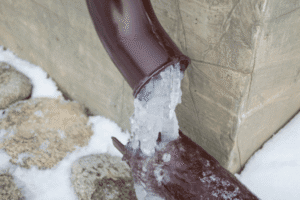Why winter drainage maintenance matters
Winter drainage maintenance is a key part of keeping commercial sites safe, accessible and operational during the colder months. Heavy rainfall, freezing temperatures and seasonal debris place additional pressure on drainage systems, and even small issues can become disruptive when demand increases. Many drainage failures during winter are avoidable with early preparation and routine checks.
Understanding how winter conditions affect drainage, and knowing what to look for, helps facilities teams reduce risks and protect their sites from unnecessary downtime. This article explains what winter weather does to drainage systems and outlines practical steps to prepare effectively.
How winter weather affects drainage systems 
Winter brings conditions that test drainage performance more than any other season. Prolonged rainfall, rapid temperature changes and increased debris all contribute to a higher likelihood of blockages, slow drainage and flooding.
Heavy rainfall increases demand on surface water drainage
During winter, rainfall is often heavier and more frequent. If gullies, channels or surface water drains contain leaves, silt or debris, water is unable to flow away as intended. This creates standing water, blocked access routes and, in more serious cases, water entering buildings.
Freezing temperatures restrict water flow
When temperatures fall, water within gullies or pipework can freeze. Frozen water expands, which can restrict the flow entirely or create cracks in the drainage system. Once the ice thaws, blocked or damaged pipes can lead to overflows.
Seasonal debris contributes to blockages
Leaves, twigs and organic matter accumulate during autumn and early winter. These materials are easily washed into drainage systems during rainfall, increasing the likelihood of blockages in yard gullies, roof gutters, channels and underground pipework.
Common drainage issues that appear during winter
Winter weather often highlights problems that may not be noticeable during drier months. Typical issues include:
- Standing water in car parks or service yards
- Slow-draining yard gullies
- Overflowing gutters and downpipes
- Water pooling near entrances and footpaths
- Repeated blockages caused by silt or leaf debris
- Surface water backing up through manholes
- Frozen or cracked pipework
These issues not only create inconvenience but can compromise safety and disrupt day-to-day operations.
Why winter drainage maintenance protects your site
A planned approach to drainage maintenance reduces the risk of unexpected disruption during bad weather. It helps businesses:
- Maintain safe access routes for staff, customers and deliveries
- Reduce the likelihood of flooding
- Prevent damage to buildings and external areas
- Avoid expensive reactive repairs
- Improve resilience during peak rainfall periods
- Support compliance with insurance and safety obligations
Winter drainage maintenance is especially important for sites with high footfall, large external areas or significant roof drainage.
How to prepare your drainage system for winter
Facilities teams can take a number of practical steps to ensure systems operate effectively throughout winter.
- Clear gullies, channels and surface drains
Removing leaves, silt and debris allows surface water to drain quickly during heavy rain. Gully pots and yard drains often fill faster than expected during autumn.
- Inspect gutters and downpipes
Roof drainage plays a major role in managing winter rainfall. Blocked gutters can overflow and direct water onto walkways, access routes or into buildings.
- Use professional jetting to restore full flow
High-pressure water jetting removes hard-to-reach debris and helps clear pipework before freezing temperatures cause further problems.
- Book a CCTV drain survey
CCTV surveys help identify structural issues such as cracks, root ingress or partial collapses that may worsen during cold weather.
- Check drainage around entrances and footpaths
Winter increases the risk of slips and falls. Ensuring good surface water drainage helps keep these areas safe.
- Review site drainage records and mapping
Clear knowledge of where assets are located makes winter inspections more efficient and supports faster emergency response if required.
How Drain & Sewer Services supports winter drainage maintenance
Drain & Sewer Services provides specialist support to help commercial sites prepare for winter conditions. Our services include:
- Gully and surface water drain cleaning
- High-pressure jetting and desilting
- CCTV inspections and drainage mapping
- Repairs to damaged or collapsed drains
- Planned preventative maintenance programmes
- 24-hour emergency drainage support
With more than 50 years of experience, our team helps organisations stay operational, safe and compliant throughout the winter season.
Preparation reduces disruption during winter
Winter weather places additional pressure on drainage systems, but many problems can be avoided through proactive maintenance. Preparing your site early helps reduce the risk of flooding, improves safety and supports reliable day-to-day operations.
For support with winter drainage maintenance, contact Drain & Sewer Services to arrange an inspection or discuss a tailored maintenance programme for your site.
Frequently asked questions
What is winter drainage maintenance?
Winter drainage maintenance refers to preparing and maintaining drainage systems to cope with heavy rainfall, freezing temperatures and seasonal debris.
How often should drains be cleaned in winter?
Most sites benefit from drainage cleaning in late autumn, with further checks during winter if debris or rainfall levels are high.
Can freezing temperatures damage drains?
Yes. Frozen water can restrict flow and cause pipework to crack, leading to blockages and overflows once temperatures rise.
Why does standing water occur more often in winter?
Drainage systems are more likely to become blocked by leaves, silt and debris, reducing their ability to handle heavy rainfall.
Should I book a CCTV drain survey before winter?
A CCTV survey can identify hidden issues that may worsen during cold weather, helping prevent unexpected failures.


